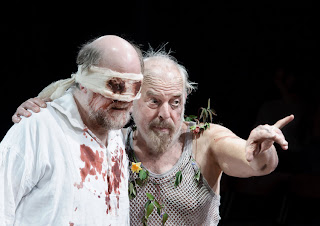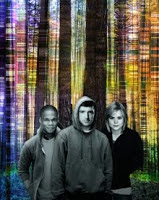The first time I came to stay in Half Moon Bay, just south of San Francisco, was 2009 and I was avid to find out what was happening at the Californian cutting edge of theatre ~ or theater, as the more logical spelling is here. My research unearthed an article in the Boston Globe ~ yes I know it's the other side of America but on roughly the same latitude ~ which I've recalled several times since. Notably when I saw Dennis Kelly's play DNA at the Egg in Bath last year, a production which vividly supported the argument below. I'm reproducing the piece, I assume with writer Louise Kennedy's tacit approval, in near-entirety. Because I agree.
Shock theater has lost its value I came to a shocking realization the other day: Apparently, I can't be shocked anymore. Or at least I can't be shocked by any play that bills itself as shocking. I can be irritated, titillated, insulted, or annoyed; more often than anything else, I can be bored. But shocked? No. I've been trying to figure out why. After all, some of the plays I've seen deal with unquestionably disturbing subjects, from child abuse to incest to torture to rape, while others use a whole sex shop's worth of props to shove their daringness in the audience's face. Many do both, and they may also throw in a few hairpin-sharp twists to keep a viewer off balance. And yet, somehow, they fail to shock.
Take David Harrower's "Blackbird," which recently closed at SpeakEasy Stage Company. It shows us two people discussing their former love affair - except that it turns out he was 40 and she was 12 when they had sex. He has done time, moved to another town, changed his name; she grows up, sees his picture in a magazine, confronts him at work; they argue, reminisce, almost have sex on the break-room floor. Along the way, we learn that their feelings about each other and about what happened between them are more complicated than the clinical language of pedophilia and child abuse would allow them to express.
To which I can only say: Well, no kidding. Life is always more complicated than the labels we give it. Human beings - all human beings - are a mess of motives and schemes, some noble and some horrific, and they find an infinite number of ways to act out or repress their desires, very few of which can be reduced to neat categories. To pretend, by suspensefully withholding and then dramatically unveiling this information, that you are shocking me is to condescend to my intelligence, as a theatergoer and as a human being.
Other plays I've seen recently find different jolts to administer, but their effect feels much the same. Adam Bock's "The Receptionist," ... Martin McDonagh's "The Lieutenant of Inishmore"... even Tracy Letts's "August: Osage County," Pulitzer winner and critical darling on Broadway last season, strikes me as an overcooked stew of every dysfunction in the book. With more twists than a nighttime soap, it ultimately reveals . . . what? That families are crazy, and some families are really crazy? Well, again, no kidding.
These are just a few examples of the kind of play that I've learned to anticipate with a weary sigh. The more I hear that a play is full of startling revelations, daring honesty, fearless confrontations with hard truths, the more I dread what I'll be seeing onstage. I do try to lay aside my dread, not least because I believe absolutely in reviewing the play, not the hype, but also because I always hope for a real theatrical experience in the theater.
The thing is, I want to be genuinely shocked. I want plays that shine a light into the darkest recesses of the human soul, that lead the audience on a journey that leaves us breathless and invigorated even if we've been terrified and deeply shaken by what we've seen. At their best, Sam Shepard and David Mamet can do this. I'm also delighted by outrageousness of the most graphic sort - Ryan Landry's deliriously blood-spattered, giddy, and weirdly moving "Medea" comes to mind, along with the flawed but incisive dark satire of Bruce Norris's "The Pain and the Itch," - as long as it treats me as an equal, a grownup with a sense of humor, rather than as some stick figure who needs to be shaken out of her imagined complacency.
 For my money, if you want real shock, it's hard to do better than Shakespeare and the Greeks. There's no shortage of gore, but the gore always means something. And - crucially, I think - the action unfolds in language, more than in elaborate visual effects. Heck, the Greeks don't even let anyone get killed onstage; we just hear about it afterward, in some of the most powerful stage speech you'll find anywhere. And while I'm not asking our current playwrights to be as great as Shakespeare or Euripides, I am asking them to remember that those are the heroes of the tradition in which they work. For I think a lot of what drives the latest wave of shock theater is a desire to compete with the dominant media of our time: movies and television.
For my money, if you want real shock, it's hard to do better than Shakespeare and the Greeks. There's no shortage of gore, but the gore always means something. And - crucially, I think - the action unfolds in language, more than in elaborate visual effects. Heck, the Greeks don't even let anyone get killed onstage; we just hear about it afterward, in some of the most powerful stage speech you'll find anywhere. And while I'm not asking our current playwrights to be as great as Shakespeare or Euripides, I am asking them to remember that those are the heroes of the tradition in which they work. For I think a lot of what drives the latest wave of shock theater is a desire to compete with the dominant media of our time: movies and television.Playwrights seize the tools of these essentially visual media - graphic imagery, turbo-powered plotting, and a heightened version of reality - and apply them to a medium that is quintessentially not visual but verbal. It's a mistake on two levels. First, because it can't possibly compete with film and TV: A stage will never look as "real" as a movie set, and stage effects become less and less powerful the more they move away from imaginative symbolism to imitative realism. More important, in moving away from the essence of drama - that is, the subtle and expert use of language and carefully developed action to illuminate human life - toward thrill-seeking and adrenaline jolts, playwrights give up their own most precious gifts.
And the audience? Jaded by the thousand unnatural shocks that electronic entertainment is heir to, we remain unmoved by its awkward imitators in the theater, even as we remain hungry for the real, visceral, cathartic thrills that true theater can provide. That's not just shocking. It's sad.

No comments:
Post a Comment